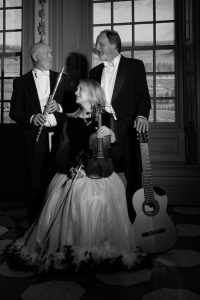Hyde Hall To Feature Special Astronomy, Music Fusion Event Sunday

By CASPAR EWIG
SPRINGFIELD
An experience in the fusion of astronomy and classical music will be offered at Hyde Hall on Sunday, July 30. The concert, titled “Celestial Melodies,” will be performed by the Musicians of Ma’alwyck. It will begin indoors at 7 p.m. and will end outdoors, weather permitting, with the viewing of a meteor display.
The concert will open with two classical pieces composed by the late 18th-century and early 19th-century composers and astronomers William Herschel and his sister, Catherine.
“The interesting part of the evening’s performance,” Ann-Marie Barker Schwartz of Ma’alwyck said, “will be that the Herschels’ music will be interspersed with visual components of their astronomic legacy as well as readings from the diary of Caroline Herschel, who was a musician and celebrated astronomer in her own right.”
Thereafter, the evening will continue with other chamber music from that era and close with a new work by composer Max Caplan inspired by the musical tones created by sonification of data received by the National Aeronautics and Space Administration from outer space.
Caplan, a composer and pianist with a Masters in Composition from the Hartt School of Music and a BA in Music and Classics from Union College, has written numerous works including a one-act chamber opera, “Aleda or The Flight of the Suff Birdwomen.”
In 1757, William Herschel immigrated to England from Germany to find work as a musician, and subsequently performed as a violist, organist, and harpsicord player. He also composed a number of symphonies, concertos and orchestral pieces. However, William and his sister both developed a passion for astronomy, and he was responsible for a number of astronomical developments including the discovery of the planet Uranus in 1781. Caroline’s work as William’s assistant in his observations, and her own cataloguing of nebulae, earned her a place as the first woman to be honored with a government position by King George III and was ultimately awarded the Gold Medal of the Royal Astronomical Society.
The astronomical theme of the evening will continue with the performance of Max Caplan’s orchestration, titled “Invocation,” which draws on the musical tones arising from the data received by NASA from outer space.
“The two movements of his piece—‘Order’ and ‘Chaos’—are really remarkable,” according to Norman Thibodeau, the flutist of the Musicians of Ma’alwyck.
And for those to whom that definition is merely a series of words strung together without meaning, Caplan’s work can best be explained by noting that “flat data received by NASA from outer space can be transformed into non speech audio, or musical mellow soundwaves which Mr. Caplan has taken and molded into an orchestral piece,” Thibodeau explained.
Founded in 1999 by violinist and director Ann-Marie Barker Schwartz, the Musicians of Ma’alwyck is a flexible-sized classical chamber music ensemble centered in the Capital Region of New York. The Musicians of Ma’alwyck shares history through music through performing at historical sites and other venues to cultivate and promote an appreciation for the diverse, rich culture of New York State.
Tickets for the concert may be purchased for $25.00 by visiting the website, www.hydehall.org /events-2/, or at the door. The concert will take place in a recently renovated building on the Hyde Hall property referred to as the Woodshed. And if the weather and sky conditions permit, the performance will end outdoors to see the Delta Aquarids meteor shower, which is predicted to peak on the date of the concert.
Hyde Hall is located at 267 Glimmerglass State Park Road, Cooperstown. For ease of access, it is recommended that one approach and gain access to Hyde Hall on the east entrance via Glimmerglass Park. Since the concert will start after 6 p.m., there will be no charge to enter the park.

